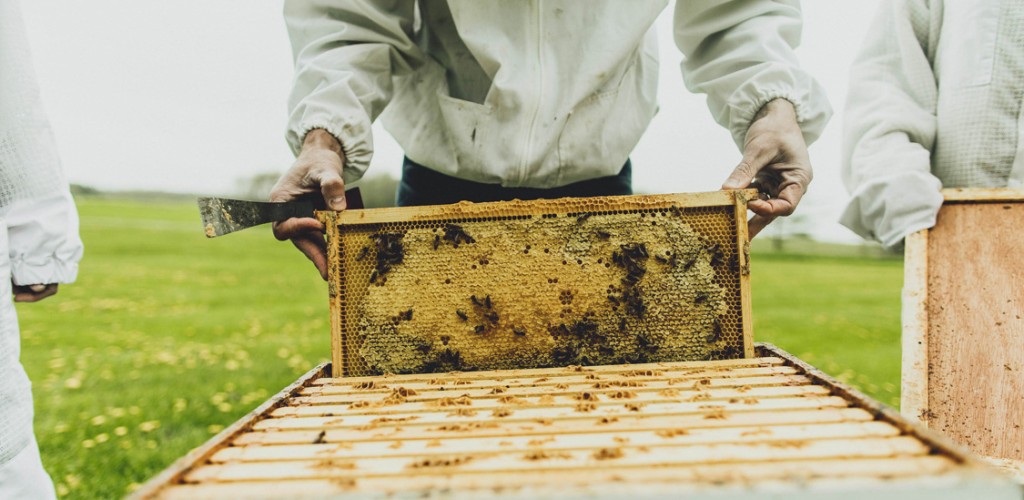On Oct. 30, Dean Kathryn J. Boor '80 recognized the Cornell Pollinator Health Team for their outstanding outreach accomplishments in a ceremony celebrating research, extension and staff excellence.
The seven-member team, which includes entomologists, pest management experts and outreach specialists, has provided crucial support to New York beekeepers and farmers. The Outstanding Accomplishments in Extension/Outreach Award honors a team effort that benefits a significant segment of the population or an important area of the state.
New York, like the rest of the world, is highly dependent on crop pollinators, which contribute roughly $170 billion a year to the global economy. Bees, a major pollinator, are in decline and considered under threat in New York state and elsewhere.
The pollinator group provides cutting-edge extension and outreach regarding these pollinator declines, including information on optimal habitats supporting managed honey bees and native bees, bee diseases, effects of pesticides on bees and economic analyses to assist beekeepers affected by declining pollinator populations.
With a focus on extension and outreach, the team has given more than 70 extension talks over the past three years in New York and elsewhere regarding pollinator health, bee diversity, integrated pest management practices and pesticide usage recommendations that minimize risks to bees. Audiences are diverse and include beekeepers, growers, lawmakers and state and federal organizations such as the New York Farm Bureau, the Audubon Society and Future Farmers of America.
Team members include:
- Bryan Danforth, professor in the Department of Entomology, who conducts research on the role of wild bees as crop pollinators.
- Jennifer Grant, who directs the Integrated Pest Management program and is a central resource for disseminating information on pollinator health and management to New York state residents and stakeholders.
- Scott McArt, assistant professor in the Department of Entomology, who interacts extensively with beekeepers, growers, policy makers and the general public regarding pollinator health, and specifically on the impact of pathogens and pesticides on bee health.
- Emma Mullen, an extension associate who has developed cutting-edge outreach programs including a Master Beekeeping Program offered through eCornell.
- Maria van Dyke, outreach specialist, who directs the Northeast Pollinator Partnership to educate apple growers about the biology, diversity and effectiveness of wild bees as an alternative to honeybees for apple pollination.
- Mary Kate Wheeler, a research aide who works closely with New York state beekeepers to provide individual economic operation analyses.
- Dan Wixted, an extension support specialist in the Cornell Cooperative Extension’s Pesticide Management Education Program, who brings expertise on pesticide toxicology to the team.
Among the team’s collaborative work is the development of a New York State Beekeeper Tech Transfer Team that works closely with individual beekeepers, collecting bee health and business data for each operation. This team then makes disease management and business recommendations for each beekeeper. Their development of a new extension website provides access to news, facts, recommendations and research on pollinator health.
The team is also working with Cornell’s College of Veterinary Medicine to develop a continuing education curriculum for veterinarians who diagnose and prescribe treatments for honey bee diseases.
"In three short years, the work of this team has made a notable impact both in scope and relevance to beekeepers," Boor said at the ceremony. "The pollinator health team represents a model for how collaboration among different units at Cornell can lead to highly integrative, creative and impactful extension and outreach efforts."
► Meet all of our 2017 Research, Extension and Staff Award winners





